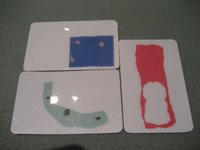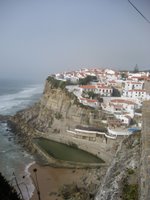
Saturday, December 02, 2006
Tuesday, November 28, 2006
Friday, November 24, 2006
Thanksgiving

It's Thanksgiving today - I'm tired, but happy. When driving home just now, I thought: there is no other place I'd rather be in, no other work that I need to do, and no better friends in world than I have now. Too exhausted to write anything like I did three years ago in another place, but just a simple "Thank You, God, for You."
Sunday, November 12, 2006
Stepping into the Ocean
A Shin-kansen stop.
Up the stairs again.
What if I stepped out
Into an ocean?
I dreamt that I knew
the language of dolphins,
that I could hear the secrets of the sea.
In the world's largest aquarium tank - a beautiful beautiful whale shark.
Giant Atlantic Crabs - or Aliens!

This penguin did not move the whole time.

Sea otter, rub rub. Kawaii!

Pocky Fish
Images to bring a smile for years to come. :-)
(Osaka Aquarium, Japan Leaf Tour Oct 2006)
Wednesday, October 18, 2006
MIX Standards
During one of the lunch time jaunts that I take by mrt-ing within the ERP zone, I wanted to pick up a something healthy(er) than the usual Nasi Padang type lunch, and so stopped by MIX at the Raffles City Marketplace.
 Now, Mix, being something of an international franchise of healthy food choices, has exactly the same storefront and menu in Singapore as it does in Hong Kong - and that was where I basically derived lunch at least two or three times a week when I was living there. It had been almost 10 months since I had a Central lunch, and I automatically ordered a Tandoori Chicken Wrap and a Detoxifier juice (without booster shot). I don't quite remember how much I paid for the juice but did make a mental note that the wrap cost S$7.50 which was almost the same as what it would cost in Hong Kong at HK$35.
Now, Mix, being something of an international franchise of healthy food choices, has exactly the same storefront and menu in Singapore as it does in Hong Kong - and that was where I basically derived lunch at least two or three times a week when I was living there. It had been almost 10 months since I had a Central lunch, and I automatically ordered a Tandoori Chicken Wrap and a Detoxifier juice (without booster shot). I don't quite remember how much I paid for the juice but did make a mental note that the wrap cost S$7.50 which was almost the same as what it would cost in Hong Kong at HK$35.While eating my lunch back in the office, I had this slightly discomfiting feeling. Well, the food didn't taste exactly the same as it did in Hong Kong, which was mildly poignant in a vague sort of way (perhaps it reminded me that some of life's experiences could not be replicated exactly), but it dawned on me how insanely expensive things have become in Singapore.
Yes, I know that the wrap costs exactly the same here and in Hong Kong, but hey, we must surely talk about spending parity, no? It is a fact of life that income levels are substantially higher in Hong Kong than in Singapore, and a fact of life that few Singaporeans would be made conscious of until they worked in both places. For instance, a legal secretary can expect to earn an average of HK$20000 to HK$35,000 per month, and that's S$4,000 to S$8,000. Can a person earning an average of $1500 to $3000 here afford a healthy MIX wrap in the same way as her counterpart in Hong Kong?
Maybe MIX is targetting a different market segment here, but that could only mean one thing - the average Singaporean cannot expect to have the same standard of living as a person in Hong Kong because things have just gotten too expensive here without a corresponding rise in salary levels.
Its not something that the garmen want us to realize but eventually we all will feel it - once buying organic lactose free milk, tomatoes on the vine and low carb chicken wrap lunches become a not unreasonably expected way of life. Of course, someone will tell you that you can always eat $3 lor mee at Amoy Street, but then who's going to actually consume anything at the giant Vivocity and all the new fangled malls coming up in the next few years?
Please, don't tell me it will be the rich IR tourists from Hong Kong and elsewhere, or the next batch of IMF delegates.
Wednesday, October 11, 2006
The Sound of Colours
Nothing too wordy, you see, for such times. For I am persuaded that this worse-than-usual flu episode was made even worse not only by Sumatran brews, but by reading too-long bond documents in a too-cold conference rooms and continuous all-parties calls all week for deals that threatened to launch, or not.
A year ago
I began to notice
that my sight was slipping away.
I sat home alone
and felt the darkness settle around me.
(translated from Jimmy Liao: 《地下铁》 The Sound of Colours)
In Liao’s bittersweet telling, a blind female narrator ventures forth into the subway, searching for an unnamed something or someone. It quickly becomes clear that nothing can restore her eyesight, but acquiring vision is another, more heartfelt, matter.


Liao pays subtle homage to some of Modern Art’s great colorists; there are visual references to Matisse, Mondrian, Chagall and even Escher’s monochromatic dreamscapes as she descends and ascends, again and again, tap-tapping out the new terrain where memory and wishfulness intersect.
There are none so blind as those who would not see.
(all graphics from The Sound of Colours, by Jimmy Liao)
An Aside:
According to one dictionary -
timbre: noun, the colour of sound.
I miss the pizza there.
Wednesday, October 04, 2006
Attempt at Modern Art
This sequence: The Four Seasons.




"A" first sign of Spring, pink in a petal
Summer Berries fall with a Stick in the Bush
Autumn Leaves fly over Two tall Towers
Santa in the Chimney, his Sleigh on the roof
Attempt at Surrealism

Meet Burnie, who's just joined from Figueres, a little town outside Barcelona where one could visit the seriously weird Salvador Dali Museum.
Haven't found the classic dial phone yet (need to go Clark Quay), so this will have to do for now.
The original inspiration - The Lobster (Aphrodisiac) Phone, Salvador Dali
Monday, September 25, 2006
IMF Party!
And what's a theme party without games! Found this very educational children's website that had dowloadable flag outlines of every country in the world, and so we played "Color the [Obscure] Country Flag" contest!
 By the time Mongolia took on the Reich colours, we were all rolling on the floor in stitches...
By the time Mongolia took on the Reich colours, we were all rolling on the floor in stitches...
Finding God V: Conversations that Disturb and Entice
When community is working, tensions may seem unresolvable and pressures overwhelming, but the opportunity to find God will remain if we stay involved. We must not yield to the urge to retreat into the silence of safe superficial chatter. We must keep talking. And our words must matter.
The richest conversations always tell a story. Each of our lives is a dramatic story of how a relational, passionate, thoughtful, purposeful and depraved person handles the experience of life. Woven into our story will always be the tragedy of our using people, our defending ourselves against them, and our worshipping ourselves. The fallen structure within each of us sees to that.
But the indelible stamp of the Savious insures that the story will also include a tale of noble inspiration, usually in an almost unrecognizable subplot, but still undeniably present. Those good passions, whether smothered beneath bad ones that rule us or released to become a driving force, are neither effective or commendable until they draw their energy from a confidence in God's goodness.
Both the storyteller and the listener need to hear the doubting soul struggling to find an identity. They need to look eagerly for the movement of God that frees people to give, to be, and to worship. Typically, conversations that lead us toward a deeper awareness of God first disrupt, then entice.
Most interactions should be pleasant ("Hi , how are you?"), functional ("Would you pick me from the airport?") or important ("As elders, we need to decide how we are going to deal with this disturbing news.") No one is quite so irritating as the junior counsellor who turns normal conversations into therapy sessions. Uninvited probing into motives and weighty expressions of concern spoil pleasant, functional and important conversations.
But true community must include meaningful moments when the quality of our relationships with God, others, and ourselves are discussed. Each of us have friends who know us well and care about us, friends who live honestly enough to wrestle with unanswered questions. With those friends, we need to risk a level of self-disclosure that makes us uncomfortable.
...
Good conversations are often disturbing. They deal with the edge in someone's voice that puts others on guard. They face up to the pain that a friend's snub or a parent's neglect has provoked. Good conversations uncover the terror and rage that often lie hidden beneath a veneer of comfortable relationship. If there aren't times when the very foundations of our relationships are torn away and we continue on only because of Christ, we are not building strong and real relationships."
Sunday, September 24, 2006
Travels in Iberia IV : The Guernica Does Exist

heh. I didn't buy the certificate, but I did see The Guernica at the exhibition, which will probably count as one of the most memorable musuem experiences that I have had, thanks to the well-considered layout of the exhibition and a very intelligent audio guide.
The guide also gave quite a lot of insight into the artist's state of mind and psychological condition during the period he painted the Guernica. I was very surprised to see the number of preparatory drawings displayed that Picasso had made leading up to the painting the final mural. There were many more things that he could have included in the picture - various people, objects, symbols etc. He was so impacted by the war that he had many things to say and represent, and what finally appear in the famous painting we see today were what he finally decided to include after many revisions. I guess it's like any piece of great art or literature, we don't always see the intense thought (and probably psychological tug of war) that had gone into their creation. It is even more telling to see the smaller paintings Picassao made after he finished the Guernica of each part of the work, with all sorts of variations, as if he continued to obsess with the images of war, not having exhausted all he wanted to show us.
It was a rare exhibition and I am glad to have had the chance to see it. My favorite amongst the three is the Manet. But all three are really powerful in presenting the reality and shock of human cruelty and pain. I guess, whether or not the artists intended the message, the paintings show that Evil does exist. We have all seen it.
Saturday, September 23, 2006
Finding God IV
Thursday, September 21, 2006
Finding God III: Lamech vs Enoch
"As we explore our lives, we must never get so immersed in ourselves that we fail to remember that there is something far more wonderful to ponder. If I am to reject Lamech's approach and come to God as Enoch came, I must surrender my fascination with myself to a more worthy preoccupation with the character and purposes of God. I am not the point. He is. I exist for him. He does not exist for me.
The question we need to ask is this: Are we merely living, or are we walking with God? Are we merely committed to feeding our own souls, to arranging our lives around getting our needs met, to building our cities? Or are we committed to knowing God, to cooperate with him as loved participants in a plan larger than ourselves, to becoming like the Son whom the Father adores, and to waiting for the city that Christ is building right now?
The path to joy lies not in recovery from wounds, or setting boundaries, but in identifying and repenting of our commitment to advance our own well-being as we see fit. When that commitment takes priority over our determination to know God and make him known to others, then my friend is wrong. Our worst problem is sin, not pain.
We need to see ourselves as more sinful than wounded. We need to face the ugly, self centred energy present in all our conversations. As we become more aware of our self-centredness, our demand to feel better weakens under our developing humility. Awarenss of our self centredness puts us in touch with our longing for a clean heart and a giving spirit. Awareness of God's forgiveness makes us gratefully amazed that we are accepted by someone who sees us at our worst. "
Saturday, September 16, 2006
Travels in Iberia III : The Other End of the Ocean
 Confirmed lah.
Confirmed lah.I like the sea best when it is The Ocean, with its waves crashing on deep rocky cliffs.
First fell in love with the ocean when I stood in front of it two years ago during the US Leaf Tour in the coast of Ogunquit, Maine.
On this trip, I saw the other end of the Atlantic Ocean. It was just as awesome.

Where does the sea end and the sky begin?
According to GPS equipment, we were at:
Latitude - 38' 47' North
Longitude - 9' 30' West
It was a good place for one to spend the afternoon talking to the ocean.

Finding God II: The Second Journey

Was reading this from the chapter "The Second Call" in Brennan Manning's The Ragamuffin Gospel:
"Many people between the ages of 30 and 60 - whatever their stature in community and whatever their personal achievements - undergo what can truly be called a second journey.
A man can have piled up an impressive portfolio of dollars and honors, and get his name in Who's Who, and then wake up one morning, asking, "Is it worth it?" Competent teachers, nurses, and clergy can reach the top only to discover that the job no longer fascinates. There is no where higher to go. They find themselves terrified of stagnation and asking, "Should I switch careers? Would returning to school help?"
Anne Tyler's heroine in her Pulitzer Prize-winning novel, Breathing Lessons, is driving along a country road with her husband. Suddenly the middle aged woman cries out. "O Ira, what are we going to do with the rest of our lives?" This is the question of the second journey.
Second journeys usually end quietly with a new wisdom and a coming to a true sense of self. The wisdom is that of an adult who has regained equilibrium and stabilized. It is wisdom that gives some things up, lets some things die, and accepts one's limitations. It is a wisdom that realized: I cannot expect anyone to understand me fully. It is a wisdom that admits the inevitability of old age and death.
The second journey begins when we know we cannot live the afternoon of life according to the morning program. The second call is a summons to a deeper, more mature commitment of faith where the naivete, first fervor, and untested idealism have been seasoned with pain, rejection, failure, loneliness and self-knowledge."
Friday, September 15, 2006
Travels in Iberia II: The Three Bears
 Ok, if you photoshopped away the tourist buses and backpackers who were commendably walking their way to the top (who probably saw more lilyponds, gingerbread houses and real fairies along the way), you could probably understand why this particular corner of the European continent was eulogized by poets:
Ok, if you photoshopped away the tourist buses and backpackers who were commendably walking their way to the top (who probably saw more lilyponds, gingerbread houses and real fairies along the way), you could probably understand why this particular corner of the European continent was eulogized by poets: I can't quite figure what it was that lent to this sense of unreality. Maybe it was the spruce and fir vegetation (lush, but not the Kota Tinggi kind of lush, as I was telling my travel buddy), or the strange mountaintop Pena castle with its colorful assemblage of minarets and sentry boxes (on entering the front gate of the castle, it looked exactly like the place where a wicked king might have locked up Rapunzel!), or because you could just imagine yourself spending a whole summer here sitting on a moldy bench at the edge of pretty Monteserrat town writing a book while little rabbits and frogs skipped past you into the forest.
I can't quite figure what it was that lent to this sense of unreality. Maybe it was the spruce and fir vegetation (lush, but not the Kota Tinggi kind of lush, as I was telling my travel buddy), or the strange mountaintop Pena castle with its colorful assemblage of minarets and sentry boxes (on entering the front gate of the castle, it looked exactly like the place where a wicked king might have locked up Rapunzel!), or because you could just imagine yourself spending a whole summer here sitting on a moldy bench at the edge of pretty Monteserrat town writing a book while little rabbits and frogs skipped past you into the forest.One wished there was more time to explore the Park (the castle's private forest) with its lakes, trees and walking trails. Or to explore the other palace, a little way below that had an intriguing name like Sete Ais ("Seven Sighs") and attractions like the Magpie Room.


We spent most of our time in the curious Pena castle, which was an absorbing blend of Hispanic-Moorish architecture on the outside and Italian renaissance drawing rooms and toilets on the inside. It had an amazing balcony looking out to the Sintra borough, with the ocean in the distance, and clouds rolling over the hills dotted with clusters of Portugese red steep roofs at your feet. That particular scenary from that vantage point had a deep impact on me, because I had always pictured that when God set on Judgement Day on His great high throne, this would be the picture before His eyes, his beautiful natural creation before Him, and his people coming out of their houses to meet Him.
I think it was at that moment during my trip when I was looking out of the glass-less windows of the stone balcony that my mind started to really rest from the stresses of pre-holiday deadlines, and to let the cool mist take away mundane cares...






